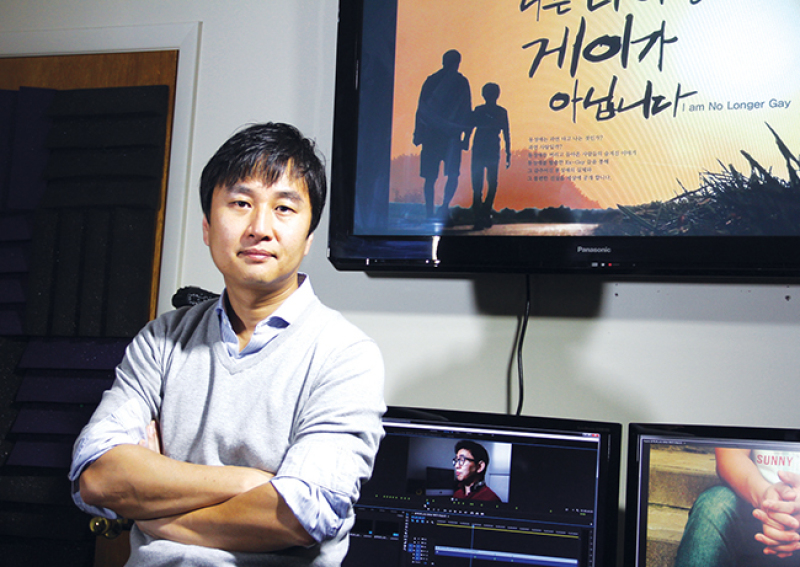
For the first time, a Korean Christian documentary film about homosexuality has been produced and released late last year: "I Am No Longer Gay."
Suffice to say, the film has been garnering much attention from the Korean public all over the world. But the director, Brian Kim, chose to have the film's first ever screening not in South Korea, where most of the research and interviewing was completed, but in America. After the first screening in a Los Angeles church on December 8, two more screenings took place in the Orange County area, and two screenings also took place on the East Coast thereafter, in New York and New Jersey. Subtitles in English were also provided to give access to English-speaking Korean Americans and non-Korean audiences.
As the U.S. recently legalized same-sex marriage nationally, Kim said he felt a significance in screening the film in the U.S. first.
"We wanted to share God's message here first," Kim said. "We believe that there will be a spiritual breakthrough starting from here."
However, Kim said the goal of the film is not to make those who have same-sex attraction feel outcasted or hated.
Instead, Kim said the film was produced with three main goals: "to share facts about homosexuality that even those who are homosexual may not be informed of; to spread awareness that there are many in the church who know and love Jesus but also have same-sex attractions; and to ask the church, "How will we embrace those who identify as LGBT?'"
One of the "facts" that Kim emphasized in particular is the relationship that homosexuality has with AIDS. According to Dr. Ansub Yeom, the director of a convalescent hospital specializing in AIDS patients in Seoul, 100 percent of the over 100 patients who have been in his hospital responded that their disease was caught due to sexual relations with another man.
The film also cites studies that show strong correlations with homosexual intercourse and greater likelihoods of being infected with HIV. The studies, Kim said, have been banned by the South Korean government from being publicized in the media.
Highlighting the AIDS issue is not to propagate a homophobia, Kim argued, but to ensure that youths and young people don't engage in unsafe sexual relationships due to misinformation or a lack of information.
"They have a right to know these facts. Media and mainstream society distort or omit certain facts to depict it in a certain way," he said.
Numerous "ex-gay' individuals who are active in the church also share their stories of how they felt when their sexual curiosities led from one thing to another, to the point that they felt they had gone "too far" and "couldn't come back."
It was this feeling of having reached a "point of no return" of sorts that caused them to seek after homosexual relationships even more, they say.
How should leaders of the church respond to such members? One female pastor who was interviewed for the film had a strong word of advice.
"If you say, "If you really love Jesus, you wouldn't do that anymore,' you are essentially killing them twice over," she says. "These are individuals who really do love Jesus."
During opening comments at the screening in Los Angeles, Director Kim compared the struggle that gay Christians may be facing to the struggle many face with pornography, and described it as a sinful addiction.
"They want to stop, but their bodies remember it and crave it, so they do it again, and they regret it. It's an addiction," Kim said. "We as the church simply have to wait alongside them."
Yet another aspect of homosexuality that Kim didn't mention specifically as a "goal' of the film, but was inevitably discussed, was the question of whether homosexuality is innate or a choice. The very focus of the film "” highlighting those who were once homosexual but are no longer "” makes the assumption that homosexuality is a choice.
Ex-gays, current gays, those in the church and outside of it share their opinions on the issue. Most whose interviews are shown in the film say they believe it's a choice.
"If it was innate, I should still want that lifestyle. But now, at age 40, I don't want it anymore," shares a Christian woman who was once lesbian.
"I don't think being gay innate," says a gay man who was interviewed at a bar, and whose identity was made hidden. "Saying it's innate is not taking responsibility for it ... If it really is love, wouldn't God have allowed some way to bear the fruit of that love?"
"I Am No Longer Gay" was completed over a period of one year and 10 months, and with an investment of some $200,000.
RTMedia, the production company behind the film, has been raising funds online (http://go.MissionFund.org/exgay) to host more free screenings at churches, schools, military bases, and other locations, and to provide subtitles in 10 different languages.
"I can't say I know everything about homosexuality," Kim said. "But there is one thing I do know, and that is this: if we stay by their side, they will come back."

















